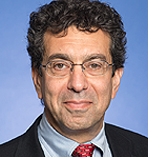William and Katherine Estes Award

To get awards news straight to your inbox, make sure to sign up for our Connect with Awards newsletter.
About the William and Katherine Estes Award
The William and Katherine Estes Award (formerly the NAS Award for Behavioral Research Relevant to the Prevention of Nuclear War) recognizes basic research in any field of cognitive or behavioral science that uses rigorous formal and empirical methods to advance our understanding of issues relating to the risk of nuclear war. This award was established by a gift of William and Katherine Estes and includes a $20,000 prize.
Most Recent Recipient
 |
Charles L. Glaser, George Washington University, received the 2021 William and Katherine Estes Award.
Glaser has made important contributions to understanding feasible and desirable forms of nuclear arms control and ballistic missile defense in light of a constantly evolving technological frontier. Glaser’s work has been influential for its combination of theoretical rigor with a strong appreciation for the technical aspects of nuclear weapons policy.
Read more about Glaser's work»
Recipients:
Charles L. Glaser (2021)
For his contributions to understanding feasible and desirable forms of nuclear arms control and ballistic missile defense, in light of a constantly evolving technological frontier. Glaser’s work has been influential for its combination of theoretical rigor with a strong appreciation for the technical aspects of nuclear weapons policy.
Read more about Glaser's work»
Watch Glaser's acceptance speech»
Etel Solingen (2018)
Solingen provided the first systematic analysis in contemporary international relations connecting political economy, globalization, and nuclear choices on the one hand with domestic politics and nuclear behavior on the other. Her theoretical and empirical contributions have left an indelible impact on work within the academy and on broader public understanding of nuclear war.
Read more about Solingen's work»
Watch Solingen's acceptance speech»
Scott D. Sagan (2015)
For his pioneering theoretical and empirical work addressing the risks of nuclear possession and deployment and the causes of nuclear proliferation.
Read more about Sagan's work»
Watch Sagan's acceptance speech»
Robert Powell (2012)
For sophisticated game theoretic models of conflict that illuminate the heart of the strategic dilemmas of nuclear deterrence, including the importance of private information.
Graham Allison (2009)
For illuminating alternative ways of thinking about political decision making with special relevance to crises, including nuclear crises, as demonstrated in his groundbreaking Essence of Decision and subsequent works.
Robert Jervis (2006)
For showing, scientifically and in policy terms, how cognitive psychology, politically contextualized, can illuminate strategies for the avoidance of nuclear war.
Walter Enders and Todd Sandler (2003)
For their joint work on transnational terrorism using game theory and time series analysis to document the cyclic and shifting nature of terrorist attacks in response to defensive counteractions.
Philip E. Tetlock (2000)
For successfully developing a semantic measure of cognitive complexity predictive of foreign policy decisions and for applying psychological analysis and knowledge to nuclear policy problems.
Alexander L. George (1997)
For combining theory with history to elucidate the requirements of deterrence, the limits to coercive diplomacy, and the relationship between force and statecraft.
Thomas C. Schelling (1993)
For his pioneering work on the logic of military strategy, nuclear war, and arms races, which has profoundly influenced our understanding of this crucial subject.
Robert Axelrod (1990)
For his imaginative use of game theory, experimentation, and computer simulation to define and test strategies for confrontation and cooperation and other models of social interaction.

